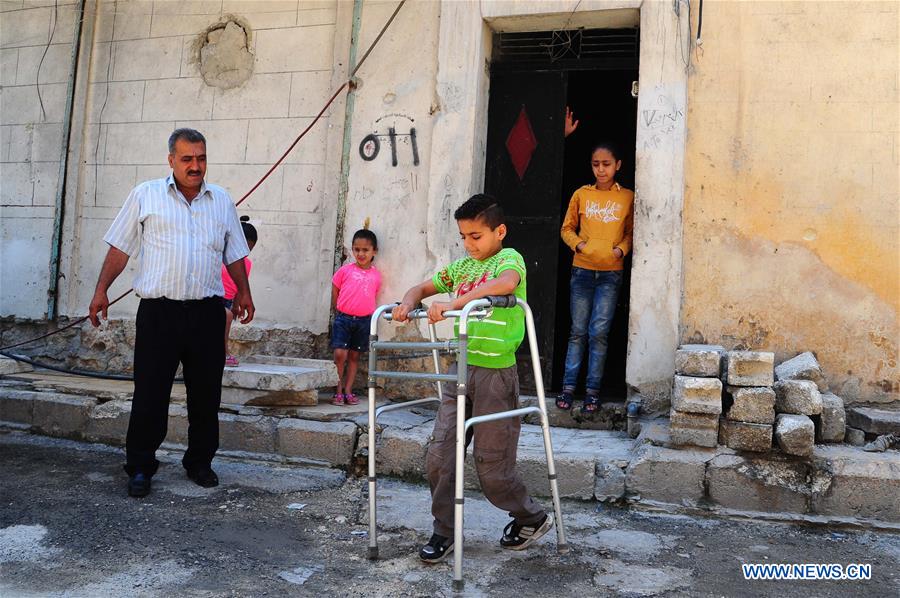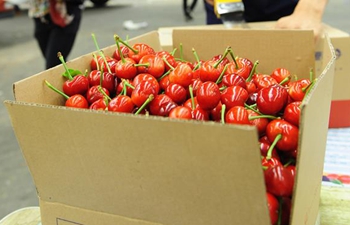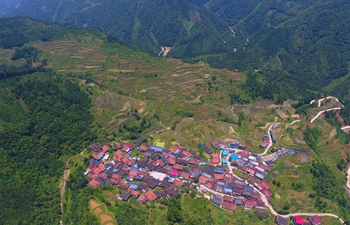
Abdullah Abduh-Rahman leaves his house using his walker with his father and sisters around him in Aleppo city in northern Syria on June 5, 2018. Abdullah Abduh-Rahman, a 10-year-old Syrian boy, hasn't left a footprint anywhere for two years, since he has to resort to a walker to continue his childhood and possibly the rest of his life marred by the war. (Xinhua/Ammar Safarjalani)
by Hummam Sheikh Ali
ALEPPO, Syria, June 8 (Xinhua) -- Abdullah Abduh-Rahman, a 10-year-old Syrian boy, hasn't left a footprint anywhere for two years, since he has to resort to a walker to continue his childhood and possibly the rest of his life marred by the war.
On his way to a local education institute in Aleppo city two years ago, shrapnels of a blind mortar shell pierced through Abdullah's back. Since then, he has found himself unable to stand on the soles of his feet.
His poor father, who had been displaced at the time of the injury, took him to several doctors, who told him that the shrapnels had damaged the nerves near the spine, leaving his son paralyzed despite a slight feeling in his legs.
Two years on, using a rusty walker to support himself with his feet dragging on his toes, Abdullah still remembers the details of his last walk.
"My father was taking my sister and me by his taxi cab to the institute. When I got out and was heading to the gate, a mortar round hit nearby and I found myself lying down on the ground shouting to my father," Abdullah recounted.
"My father opened the car's front door and came to me crawling as the sounds of mortars could still be heard. He tried to make me stand up, but I couldn't as blood was trickling out of my back," he continued.
The doctors later gave the medical label to his injury: a hemiplegia, but said there is possible improvement in the future.
"I can no longer stand on my feet or play with my friends as we used to do before," the Syrian boy said.
The hardest days were the first seven months after the incident, as he remained indoors with his five sisters, unable to run or play his favorite football games with his friends.
"I wished I could recover and play football again with my friends as we used to before my injury," he said.
Despite his condition, Abdullah keeps the smile on his face where optimism always radiates from his eyes, penetrating the hearts of the people around as if his disability has given him a strength that no walking man could ever feel.
Standing on his own feet again is his dream, but it's not the only one. The boy also hopes to become a pediatrician.
"I want to grow up to become a doctor to treat children," he said.
Abdullah maintains a routine of seeing a physical therapist to help him get better.
At first, the therapist would come at his home, but then he started moving on his walker to get to the therapist and go to school with the help of his friends.
The boy said that some friends at his school suffer from similar conditions and ended up on wheelchairs or walkers.
For Abdullah, his injury was unfortunate as he was hit by the mortar round just four months ahead of the full liberation of the Aleppo city in December 2016.
His sister Qamar said Abdullah cannot move too fast or too far on his walker.
"I really wish if he could stand again and play with his friends like before," she said.
His father, who is a state employee in the morning and a taxi driver in the evening, usually carries him down the stairs until reaching the entrance of their building in a ravaged neighborhood in the largely-destroyed formerly rebel-held eastern part of Aleppo.
Outside of the house, Abdullah is sitting and playing with his sisters.
"Run! Run!" Abdullah shouted at his sisters as if he wants them to run for him, hoping to join them one day.















